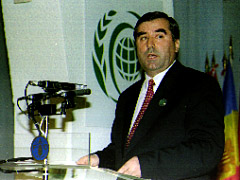


TAJIKISTAN - TADJIKISTAN - TAYIKISTAN | ||
His Excellency Emomali Rakhmonov, President of the Republic of Tajikistan | ||

First of all, I would like to express my sincere gratitude to Mr. Jacques Diouf, the Director-General of FAO, for the invitation to take part in the work of the World Food Summit. The convening of the World Food Summit, with the participation of the Heads of State and Government, will play an important role in settling the problem of eliminating hunger, malnutrition and achieving food security by working together in establishing joint policies of actions at the global, regional and national level. My country, which recently celebrated the fifth anniversary of its independence, became a member of FAO in November 1995 and we very much favour close cooperation with it. We avail ourselves of this opportunity, in order to express our gratitude to donor States and to FAO, for the urgent assistance provided, in order to solve the problem of the locust plague in the territory of our Republic in the last two years. In future, we also hope to be able to count on close and long-term cooperation with FAO. We consider that, at present, the world community has no more important and human problem than to ensure food security and to eliminate the threat of hunger, to create for all populations conditions that will allow free access to food so that we can have a healthy life and ensure employment. At present, because of the split of the economic ties with the former Republics of the Soviet Union and the consequences of civil war, as well as natural disasters that occurred in our Republic in 1992 and 1993, there has been a sharp reduction in imports and a decrease in productivity in the agricultural sector. As a result, my people have serious difficulties in supplying food to the population. This problem is aggravated, also, by the fact that 93 percent of the territory of Tajikistan is occupied by mountains. The people of Tajikistan greatly appreciate the assistance given by friendly countries and international organizations, such as FAO, in order to help us overcome this food deficit. We would like to hope that such support will also be provided in the future, until our country can come out of its very difficult economic crisis. We undertook specific measures to increase self-sufficiency in food production. We have proceeded to carry out a programme of economic reforms in the agro-industrial sector in the country. Within the framework of this programme, land reform, reorganization of collective and state farms and other projects regarding the agro-industrial complex, such as privatization of enterprises which process agricultural food, have also been implemented. Further along the way, in order to ensure food security in the last period, we are also implementing a policy which will increase the supply to populations of homemade bread. The natural climatic conditions of Tajikistan, allow us to increase the production of fruits and vegetables, potatoes and grapes and to have two crops a year from most of the farmland. But at present, settling the problem of ensuring that the population is self-sufficient in food is very difficult because during the transition period the country's economy has been in deep crisis. There are not sufficient means for purchasing technical resources, such as fertilizer, agricultural machinery, etc. A large number of developing countries and also countries in transition, do not have a very good balance of payments. They have a considerable foreign debt, they do not have sufficient means, not only for developing food self-sufficiency but also for purchasing food in world markets. Due to this, it might be interesting to look at the possibility of creating a special monetary fund at United Nations level, using the resources from developed countries and rich countries, in order to subsidize the purchase of food for the poorer countries, at least, for some period of time. We consider that, first of all, each country should aspire to become self-sufficent in food. In our opinion, supporting the agricultural sector of many countries, by providing material and technical resources, is the most efficient and quickest way of increasing agricultural yields and production. It is for this reason that I would request the World Food Summit to pay special attention to matters of increasing delivery of material and technical resources, in order to grow food in various areas. This will reduce unnecessary expenditure for transporting foodstuffs and at the same time, it will solve the important problem of local populations' underemployment which will result in an increase in food production. One more, no less important problem, is irrigation. We need to satisfy the water needs of central Asian countries so that land can be irrigated properly, in order to supply the population with the agricultural products that they need and solve the problems in the Tajikistan area where the rivers feed the Aral Sea. We are seriously concerned by the problems of the Mountainous Sarezs Lake area which is situated in a seismic earthquake zone that can read nine on the Richter scale and where more than 16 cubic kilometres of water are stored. Urgent measures have to be taken to ensure the security of this Lake and for this reason, specific protection measures have to be taken in order to protect it. Settling this problem needs a joint effort, the effort of the international community as well, because it is in the interest of not just Tajikistan but many other countries. In conclusion, at this august assembly, may I express the hope that elimination of hunger, malnutrition and the achievement of food security will be solved in a positive manner on a global scale. For our part, we are ready to make our contribution, in order to fulfil the decisions at this Summit. | ||
|
|
|
|

 |